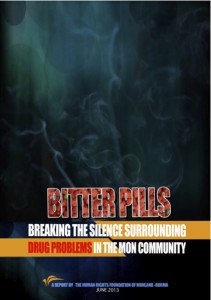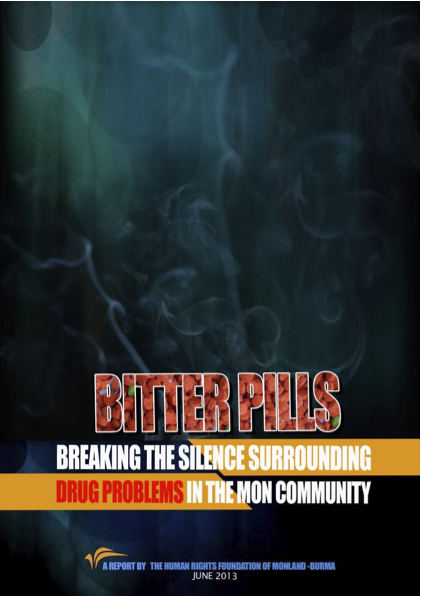Min Thukha Aung — The trafficking and use of drugs within the Mon communities is systemic, and there are no government initiatives in place to prevent this, said a new report released by the Human Rights Foundation of Monland (HURFOM) on June 19.

The 63-page report, titled “Bitter Pills: Breaking the Silence Surrounding Drug Problems in the Mon Community” highlights the widespread trafficking of drugs and consumption by Mon communities. The report that draws on the testimonies 140 residents in Mon and Karen states, calls for immediate action by the government, local authorities, ethnic political parties and civil society groups.
Methamphetamine, in the form of yaba pills, and Kratom (heroin leaves) has become prevalent in Mon communities, particularly popular with youth. Part of the problem is the drugs are so accessible.
“It is easy to buy drugs. We can buy them at the betel nut shop for around 3,000 to 5,000 Kyat per tablet. It is easy to get drugs if you have friends in Koemine or Hnin Sone villages, or in Ye Township.” according to man from Ye Township quoted in the report.
Nai Aue Mon, program coordinator for HURFOM, told IMNA on Wednesday that the report urges “the government and political parties to take action on this drug issue”. Drugs have become something that is common “in our culture” and “it is directly impacting the community”.
The report also revealed that some local authorities are involved in the drug trade. Corrupt officials may take bribes from dealers in exchange for turning a blind eye on the sale and use of these drugs within the community. Drug dealers may also have direct connections with the military and ceasefire groups.
“Most people want the drug problem to be dealt with. But who or which organization can make it stop when the military and authorities themselves are involved? Most of the people selling drugs are related to military forces, authorities and ceasefire groups,” said one community volunteer in the report.
HURFOM faced many obstacles to collect data for the report. Researchers were prevented from gathering information in areas affected by drugs by the Burma military. The police and ceasefire groups were hesitant about disclosing information related to drugs.
A general lack of transparency on these issues has resulted in some sections of the report being incomplete.
HURFOM stressed the need for further research on this problem and to undertake this urged for more cooperation by the government, ethnic armed groups and civil society groups.
The report recommends for the government to “publicly acknowledge the drug problem in Mon and Karen States and initiate detailed research into the matter”. But for a solution to be found they need “to reduce unemployment and other conditions that encourage rising drug use in Mon communities, in particular creating new job opportunities”.
It also called for “the international community to acknowledge and take an interest in the drugs problems in Mon and Karen States.”
HURFOM was established by Mon youths in 1995 “for the restoration of democracy, human rights and genuine peace in Burma”. It has been a key member of the Network for Human Rights Documentation – Burma (ND-Burma) since forming in 2004.
(A PDF of the HURFOM report is available on their website: hyperlink)

